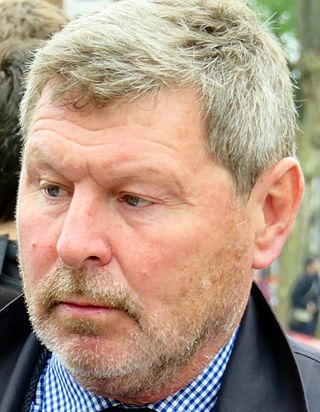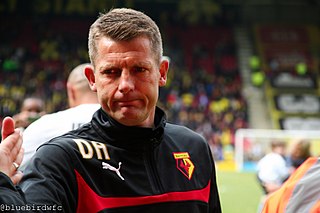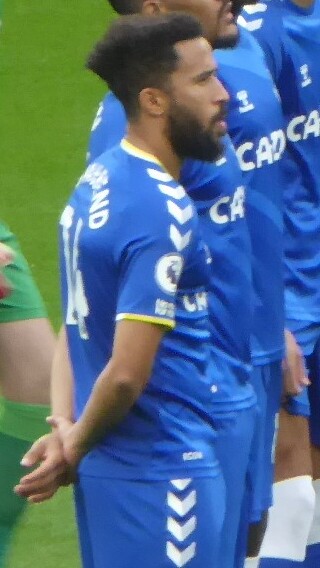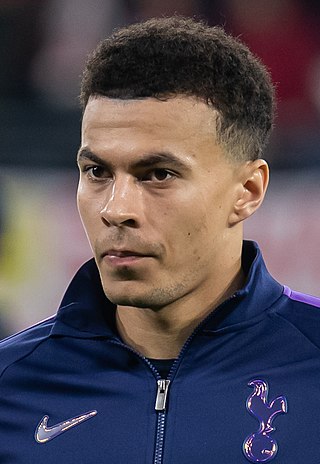Related Research Articles

Ronny Rosenthal, nicknamed "Rocket Ronny", is an Israeli former footballer who played as a forward.
The 1992–93 FA Premier League was the inaugural season of the Premier League, the top division of English football. The season began on 15 August 1992 and ended on 11 May 1993. The league was made up of the 22 clubs that broke away from The Football League at the end of the 1991–92 season. The new league was backed up by a five-year, £304 million deal with Sky to televise Premier League matches. In concept, the Premier League was identical to the old First Division of the Football League, which was now reduced to three divisions.
The 1994–95 FA Premier League was the third season of the competition, since its formation in 1992 as the top division of professional football in England. Due to the decision to reduce the number of clubs in the FA Premier League from 22 to 20 starting from next season, a total of four clubs were to be relegated.
The 1997–98 FA Premier League was the sixth season of the FA Premier League. It saw Arsenal lift their first league title since 1991 and, in so doing, became only the second team to win The Double for the second time.

Matthew Brooke Jansen is an English former professional footballer who played as a striker.

Clive Darren Allen is an English former professional footballer who played as a forward for seven different London clubs. Allen was a prolific striker throughout his career.

Terence William Fenwick is a former English football manager and player who played either as a centre-back or a full-back.
Anthony Derek Gardner is an English former professional footballer who played as a centre back. He played once for the England national team and was bought and sold for millions of pounds in the domestic transfer market. However, his career was dogged with injuries, limiting his appearances.
The 1994–95 season was the 115th season of competitive football in England.

Dean Barry Austin is an English football manager and former professional player who is currently head of recruitment at Coventry City.

Andros Darryl Townsend Sr is an English professional footballer who plays as a right winger for Premier League club Luton Town.
During the 1994–95 English football season, Tottenham Hotspur F.C. competed in the FA Premier League.
The 2004–05 season was Tottenham Hotspur's 13th season in the Premier League and 27th successive season in the top division of the English football league system.
The 2002–03 season was Tottenham Hotspur's 11th season in the Premier League and 25th successive season in the top division of the English football league system.
During the 1995–96 season, Tottenham Hotspur participated in the FA Premier League.
The 1992–93 season was the 87th season of competitive football played by Tottenham Hotspur. They competed in the inaugural season of the FA Premier League.

Bamidele Jermaine Alli is an English professional footballer who plays as an attacking midfielder for Premier League club Everton.
The 2013–14 season was the 134th season of competitive football in England.
The 2017–18 season was Tottenham Hotspur's 26th season in the Premier League and 40th successive season in the top division of the English football league system. Along with the Premier League, the club competed in the Champions League, FA Cup and EFL Cup. Following the rebuilding of White Hart Lane, Spurs played all home fixtures at Wembley Stadium during this season at full 90,000 capacity. The season also marked a change in kit suppliers as Nike replaced Under Armour.
The 2018–19 season was Tottenham Hotspur's 27th season in the Premier League and 41st successive season in the top division of the English football league system. Along with the league, the club competed in the FA Cup, EFL Cup and UEFA Champions League.
References
- 1 2 Hugman, Barry J., ed. (2003). The PFA Footballers' Who's Who 2003/2004. Queen Anne Press. p. 27. ISBN 1-85291-651-6.
- ↑ "England Uncapped & Black Players - Chris Armstrong". www.englandfootballonline.com. Retrieved 18 June 2019.
- 1 2 Mackay, Duncan (27 April 2002). "Why English football has a drugs problem". The Guardian. Retrieved 15 August 2018.
- 1 2 Moore, Glenn (7 March 1995). "The FA has suspended Chris Armstrong of Crystal Palace for smoking a private spliff". The Independent. Retrieved 16 August 2018.
- 1 2 3 4 "Ten things you didn't know about Chris Armstrong". The Guardian. 25 March 1999. Retrieved 15 August 2018.
- 1 2 3 Moore, Glenn (26 August 1995). "Why Armstrong put Spurs before money". The Independent. Retrieved 16 August 2018.
- ↑ Sporting Heroes - Extracted 24 January 2012
- 1 2 3 4 "Armstrong opts for Spurs". New Straits Times. AFP. 21 June 1995. Retrieved 16 August 2018.
- ↑ Fayiga, Kunle (28 August 2018). "Wilfried Zaha can truly be fulfilled at Crystal Palace". Goal.com. Retrieved 30 August 2018.
- ↑ "The record sale progression of every Premier League club". Football 365. 28 June 1997. Retrieved 16 August 2018.
- ↑ "Games played by Chris Armstrong in 1995/1996". Soccerbase. Retrieved 16 August 2018.
- ↑ Moore, Glenn (2 January 1996). "United's frailties exposed by Spurs". The Independent. Retrieved 16 August 2018.
- ↑ Rowbottom, Mike (29 December 1998). "Football: Armstrong treble traumatises Everton". The Independent. Retrieved 16 August 2018.
- ↑ Fordyce, Tom (20 July 2001). "Spurs' forgotten striker fights back". BBC Sport. Retrieved 16 August 2018.
- ↑ "Chris Armstrong: The first interview". Daily Post. 20 April 2013. Retrieved 16 August 2018.
- ↑ Nixon, Alan (29 August 2002). "Bolton sign Armstrong on low-wage deal". The Independent. Retrieved 15 August 2018.
- ↑ "Bolton 0–1 Bury". BBC Sport. 2 October 2002. Retrieved 15 August 2018.
- ↑ "Armstrong joins Wrexham". BBC Sport. 4 July 2003. Retrieved 15 August 2018.
- ↑ "England - International Results B-Team - Details". RSSSF . Retrieved 15 August 2018.
- ↑ "England hit by striker crisis". BBC. 24 March 1999. Retrieved 28 October 2014.
- ↑ Bell, Jess (19 September 2016). "Former Crystal Palace star Chris Armstrong guilty of possessing cocaine, ecstasy and cannabis". Wandsworth Guardian. Retrieved 16 August 2018.
- ↑ Whittingham, Adela (27 January 2022). "Former footballer Chris Armstrong admits assaulting Tesco worker in row over cigarettes". Evening Chronicle. Retrieved 27 January 2022.
- ↑ Whittingham, Adela; Sharma, Sonia (1 March 2022). "Newcastle-born footballer Chris Armstrong punched and kicked Tesco worker in row over cigarettes". Evening Chronicle. Retrieved 1 March 2022.
- ↑ "Nielsen nicks it for Spurs". BBC Sport. 22 March 1999. Retrieved 30 March 2024.
- ↑ Lynch. The Official P.F.A. Footballers Heroes. p. 150.